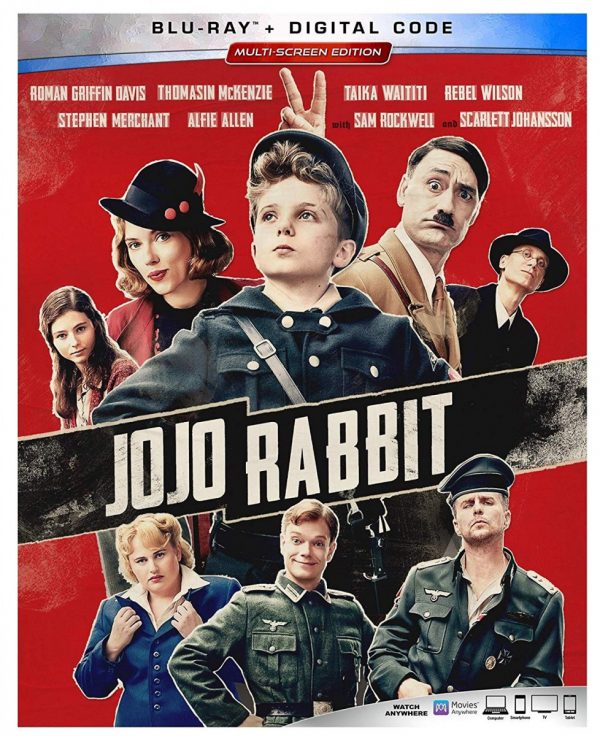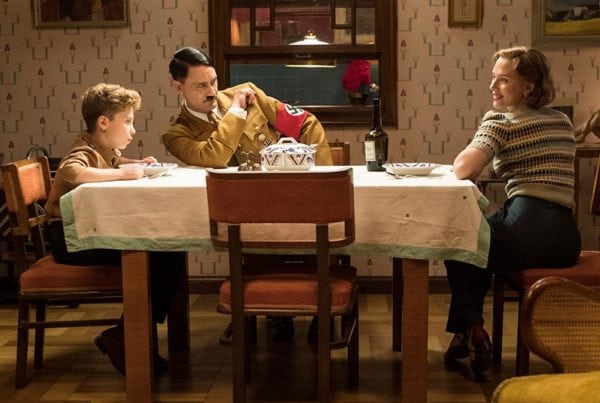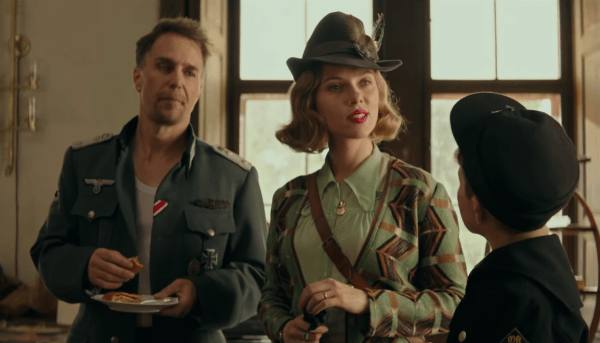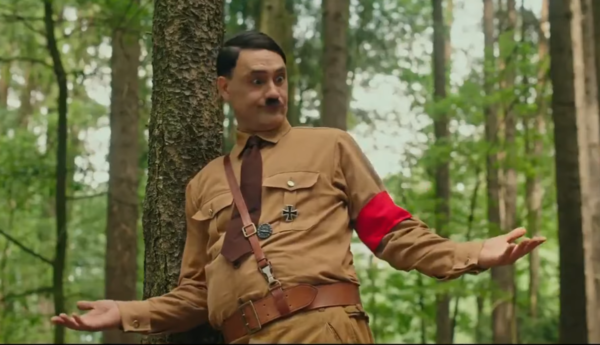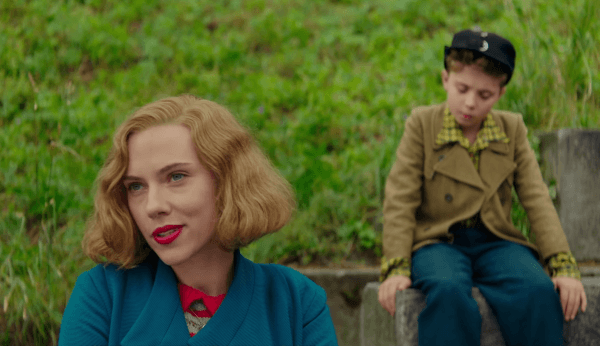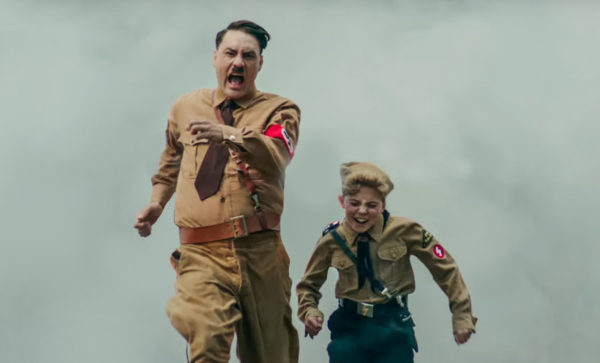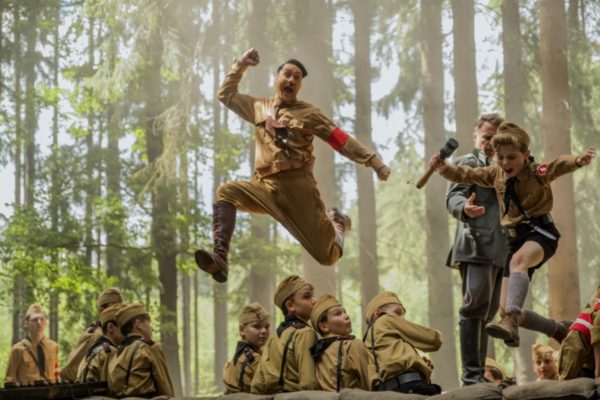Jojo Rabbit, 2019.
Directed by Taika Waititi.
Starring Roman Griffin Davis, Thomasin McKenzie, Taika Waititi, Rebel Wilson, Stephen Merchant, Alfie Allen, Sam Rockwell, and Scarlett Johansson.
SYNOPSIS:
Jojo Rabbit, a coming-of-age World War II story with humor and heart, arrives on Blu-ray with a light smattering of bonus features. The film has some missteps, as does the commentary track, but at a minimum, it’s worth a rental.
Taika Waititi is easily my favorite of the new crop of directors who have broken through over the past decade or so. His work has shades of Wes Anderson, who is one of my all-time top directors, so I wasn’t surprised that I found his take on Thor so delightful. And now he has stepped into tricky territory with Jojo Rabbit, a coming-of-age story set during the last months of World War II.
This isn’t a typical World War II film, however. The main character is Johannes “Jojo” Betzler (Roman Griffin Davis), a 10-year-old boy indoctrinated into Nazi philosophy who is thrilled for his chance to attend a Hitler Youth camp. He has a good friend named Yorki, but his best friend is an imaginary version of Adolf Hitler, who acts as a sounding board for him when he faces difficult situations.
Jojo is a sensitive boy, so it turns out that the Hitler Youth isn’t quite for him. The local camp is run by Captain Klenzendorf (Sam Rockwell), a closeted gay officer who, in his words, was responsible for “Operation Screw-Up,” which cost him the use of one eye and led to his demotion from the battlefield. When Jojo refuses to kill a rabbit, he’s bullied by other Hitler Youth, who give him the nickname “Jojo Rabbit.”
Back home, his mother Rosie (Scarlett Johansson) does her best to maintain a job and run a household by herself. Jojo’s older sister died of influenza, and his father is absent – the boy believes he’s fighting on the Italian front, but it’s not clear what happened to him. Rosie is also harboring a secret: a teenage Jewish girl named Elsa (Thomasin McKenzie) is hiding in her home, and Jojo stumbles across her one day.
Now Jojo must reconcile the beliefs that have been drilled into his head with the fact that Elsa doesn’t seem to live up to any of the things he has been taught. He must also contend with the fact that if he tells the Gestapo about her, his mother will surely pay the same price as the people he saw hanging in the town square one day.
Davis is delightful in the role of Jojo, especially when he has to put on wide-eyed wonder and excitement, two things that even wartime kids are capable of. He’s not as believable in the more emotional scenes, though, and Johansson didn’t really do it for me as his mother. I’ve never been a huge fan of hers; I wonder if she was cast because the film needed a big name to help the box office numbers. I’ll add here that Rosie’s ultimate fate felt needless and hampered the final act of the story.
However, Rockwell is amazing as Captain Klenzendorf, as is Alfie Allen as Finkel, the second-in-command who’s clearly on the down-low with his boss. And Waititi captures the right nuances as an exaggerated version of Hitler who we see, like everyone and everything else in the film, through Jojo’s eyes. There are some shades of Charlie Chaplin in The Great Dictator here.
I realize some people feel that the film puts a hazy sheen on Nazis that’s not needed today, given the resurgence in that ideology around the world, but I argue that Jojo Rabbit does an excellent job of satirizing how ridiculous they were then and still are now. Yes, Klenzendorf displays a bit of humanity, but it’s not hard to imagine that there were Nazis in the final days of the war who had some regrets and went against their ideology – Polanski’s The Pianist has a similar moment in its third act.
This Blu-ray is a bit light on bonus features. If you’re a Waititi fan, though, you’ll appreciate how much of his personality is on display here. Even the 3.5 minutes of outtakes, which normally aren’t that interesting for other films, are fun to watch. There are also three deleted scenes that run about nine minutes – it’s obvious why they were cut, although the alternate version of Jojo’s final scene with Hitler has some nice emotional beats that might have played better in the film. And the cut scene with Hermann Goering is very funny, although it didn’t need to be in the movie.
There’s also a 30-minute making-of featurette, Inside Jojo Rabbit, that features interviews with Waititi and the cast. It’s a nice, albeit brief, behind-the-scenes look at the film. I was hoping that Waititi’s commentary track would fill in some of the holes, but I found it to be a disappointment. He imparts a little bit of interesting information about the film, but there are large chunks of silence, and he spends a good amount of time calling cast members and talking to them about the movie.
I suppose the phone calls seemed like a funny idea at the time, but I would have preferred that they occupy a separate bonus feature. Waititi is fun to listen to, but it would have been nice if he had approached the track with a plan for what to talk about, rather than try to turn it into a performance piece. But even smart, funny folks make missteps sometimes.
Flickering Myth Rating – Film: ★★★ / Movie: ★★★
Brad Cook
